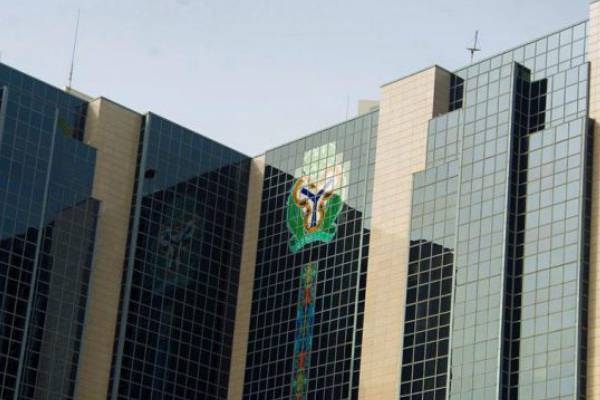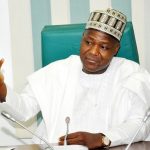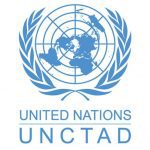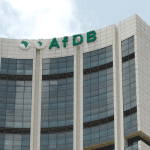The Federal Government has been urged to address the fundamentals across the Fiscal Space in Nigeria before the challenges facing the nations’ Economy can be addressed.
Economist and Executive Director, Centre For the Promotion of Private Enterprise, Dr Muda Yussuf, made this call while speaking to TVC News Tolulope Ogunjobi, on Business Nigeria on Monday Afternoon.
Dr Yussuf who was reacting to the Statement credited to the Governor of the Central Bank of Nigeria on the expected drop of Inflation form the current level of 21.47% to 15% by the end of 2023 said the way and manner the Central Bank of Nigeria have been handling issues will not help the nations’ Economy.
He said fundamental issues around the Fiscal space must be addressed before ongoing challenges like Fuel Scarcity and Inflation cannot be addressed by Fiat or pronouncements like the Department of State Services recently did to the Nigerian National Petroleum Company Limited.
According to him challenges will abound for an Economy that spends over 15 Billion Dollars annually to import refined Petroleum Products especially in the face of the Current World wide challenges in most Sectors and Countries.
He urged the Federal Government to start looking at the Fundamentals in the Macro-Economic spectrum before making further attempts at addressing the symptoms which is what is currently being done.
He added that addressing the fundamentals will lead to the solving of the problem from the roots.
He said this current situation has led to the downgrading of Nigeria’s credit rating by Moodys and Other credit rating agencies which is an impediment for any steps taken by the Federal; Government to improve the Economy or develop the day to day living standards of the People.
Going Further, He said one of the First steps to take is to reform the Oil and Gas Sector which he described as very critical to the survival of the Nigerian Economy.
He disclosed that there are three main components to the reform which he listed as the Subsidy Component, the Investment Component and the Revenue Component.
He said if the sector had been properly reformed before now, their would be no issue of divestment in the upstream sector.
He said the Challenges from the Sector is in both the upstream and Downstream sectors pointing at the current situation where all Other Petroleum producing Countries are smiling .
The Federal Government has been urged to address the fundamentals across the Fiscal Space in Nigeria before the challenges facing the nations’ Economy can be addressed.
Economist and Executive Director, Centre For the Promotion of Private Enterprise, Dr Muda Yussuf, made this call while speaking to TVC News Tolulope Ogunjobi, on Business Nigeria on Monday Afternoon.
Dr Yussuf who was reacting to the Statement credited to the Governor of the Central Bank of Nigeria on the expected drop of Inflation form the current level of 21.47% to 15% by the end of 2023 said the way and manner the Central Bank of Nigeria have been handling issues will not help the nations’ Economy.
He said fundamental issues around the Fiscal space must be addressed before ongoing challenges like Fuel Scarcity and Inflation cannot be addressed by Fiat or pronouncements like the Department of State Services recently did to the Nigerian National Petroleum Company Limited.
According to him challenges will abound for an Economy that spends over 15 Billion Dollars annually to import refined Petroleum Products especially in the face of the Current World wide challenges in most Sectors and Countries.
He urged the Federal Government to start looking at the Fundamentals in the Macro-Economic spectrum before making further attempts at addressing the symptoms which is what is currently being done.
He added that addressing the fundamentals will lead to the solving of the problem from the roots.
He said this current situation has led to the downgrading of Nigeria’s credit rating by Moodys and Other credit rating agencies which is an impediment for any steps taken by the Federal; Government to improve the Economy or develop the day to day living standards of the People.
Going Further, He said one of the First steps to take is to reform the Oil and Gas Sector which he described as very critical to the survival of the Nigerian Economy.
He disclosed that there are three main components to the reform which he listed as the Subsidy Component, the Investment Component and the Revenue Component.
He said if the sector had been properly reformed before now, their would be no issue of divestment in the upstream sector.
He said the Challenges from the Sector is in both the upstream and Downstream sectors pointing at the current situation where all Other Petroleum producing Countries are smiling .
The Federal Government has been urged to address the fundamentals across the Fiscal Space in Nigeria before the challenges facing the nations’ Economy can be addressed.
Economist and Executive Director, Centre For the Promotion of Private Enterprise, Dr Muda Yussuf, made this call while speaking to TVC News Tolulope Ogunjobi, on Business Nigeria on Monday Afternoon.
Dr Yussuf who was reacting to the Statement credited to the Governor of the Central Bank of Nigeria on the expected drop of Inflation form the current level of 21.47% to 15% by the end of 2023 said the way and manner the Central Bank of Nigeria have been handling issues will not help the nations’ Economy.
He said fundamental issues around the Fiscal space must be addressed before ongoing challenges like Fuel Scarcity and Inflation cannot be addressed by Fiat or pronouncements like the Department of State Services recently did to the Nigerian National Petroleum Company Limited.
According to him challenges will abound for an Economy that spends over 15 Billion Dollars annually to import refined Petroleum Products especially in the face of the Current World wide challenges in most Sectors and Countries.
He urged the Federal Government to start looking at the Fundamentals in the Macro-Economic spectrum before making further attempts at addressing the symptoms which is what is currently being done.
He added that addressing the fundamentals will lead to the solving of the problem from the roots.
He said this current situation has led to the downgrading of Nigeria’s credit rating by Moodys and Other credit rating agencies which is an impediment for any steps taken by the Federal; Government to improve the Economy or develop the day to day living standards of the People.
Going Further, He said one of the First steps to take is to reform the Oil and Gas Sector which he described as very critical to the survival of the Nigerian Economy.
He disclosed that there are three main components to the reform which he listed as the Subsidy Component, the Investment Component and the Revenue Component.
He said if the sector had been properly reformed before now, their would be no issue of divestment in the upstream sector.
He said the Challenges from the Sector is in both the upstream and Downstream sectors pointing at the current situation where all Other Petroleum producing Countries are smiling .
The Federal Government has been urged to address the fundamentals across the Fiscal Space in Nigeria before the challenges facing the nations’ Economy can be addressed.
Economist and Executive Director, Centre For the Promotion of Private Enterprise, Dr Muda Yussuf, made this call while speaking to TVC News Tolulope Ogunjobi, on Business Nigeria on Monday Afternoon.
Dr Yussuf who was reacting to the Statement credited to the Governor of the Central Bank of Nigeria on the expected drop of Inflation form the current level of 21.47% to 15% by the end of 2023 said the way and manner the Central Bank of Nigeria have been handling issues will not help the nations’ Economy.
He said fundamental issues around the Fiscal space must be addressed before ongoing challenges like Fuel Scarcity and Inflation cannot be addressed by Fiat or pronouncements like the Department of State Services recently did to the Nigerian National Petroleum Company Limited.
According to him challenges will abound for an Economy that spends over 15 Billion Dollars annually to import refined Petroleum Products especially in the face of the Current World wide challenges in most Sectors and Countries.
He urged the Federal Government to start looking at the Fundamentals in the Macro-Economic spectrum before making further attempts at addressing the symptoms which is what is currently being done.
He added that addressing the fundamentals will lead to the solving of the problem from the roots.
He said this current situation has led to the downgrading of Nigeria’s credit rating by Moodys and Other credit rating agencies which is an impediment for any steps taken by the Federal; Government to improve the Economy or develop the day to day living standards of the People.
Going Further, He said one of the First steps to take is to reform the Oil and Gas Sector which he described as very critical to the survival of the Nigerian Economy.
He disclosed that there are three main components to the reform which he listed as the Subsidy Component, the Investment Component and the Revenue Component.
He said if the sector had been properly reformed before now, their would be no issue of divestment in the upstream sector.
He said the Challenges from the Sector is in both the upstream and Downstream sectors pointing at the current situation where all Other Petroleum producing Countries are smiling .
The Federal Government has been urged to address the fundamentals across the Fiscal Space in Nigeria before the challenges facing the nations’ Economy can be addressed.
Economist and Executive Director, Centre For the Promotion of Private Enterprise, Dr Muda Yussuf, made this call while speaking to TVC News Tolulope Ogunjobi, on Business Nigeria on Monday Afternoon.
Dr Yussuf who was reacting to the Statement credited to the Governor of the Central Bank of Nigeria on the expected drop of Inflation form the current level of 21.47% to 15% by the end of 2023 said the way and manner the Central Bank of Nigeria have been handling issues will not help the nations’ Economy.
He said fundamental issues around the Fiscal space must be addressed before ongoing challenges like Fuel Scarcity and Inflation cannot be addressed by Fiat or pronouncements like the Department of State Services recently did to the Nigerian National Petroleum Company Limited.
According to him challenges will abound for an Economy that spends over 15 Billion Dollars annually to import refined Petroleum Products especially in the face of the Current World wide challenges in most Sectors and Countries.
He urged the Federal Government to start looking at the Fundamentals in the Macro-Economic spectrum before making further attempts at addressing the symptoms which is what is currently being done.
He added that addressing the fundamentals will lead to the solving of the problem from the roots.
He said this current situation has led to the downgrading of Nigeria’s credit rating by Moodys and Other credit rating agencies which is an impediment for any steps taken by the Federal; Government to improve the Economy or develop the day to day living standards of the People.
Going Further, He said one of the First steps to take is to reform the Oil and Gas Sector which he described as very critical to the survival of the Nigerian Economy.
He disclosed that there are three main components to the reform which he listed as the Subsidy Component, the Investment Component and the Revenue Component.
He said if the sector had been properly reformed before now, their would be no issue of divestment in the upstream sector.
He said the Challenges from the Sector is in both the upstream and Downstream sectors pointing at the current situation where all Other Petroleum producing Countries are smiling .
The Federal Government has been urged to address the fundamentals across the Fiscal Space in Nigeria before the challenges facing the nations’ Economy can be addressed.
Economist and Executive Director, Centre For the Promotion of Private Enterprise, Dr Muda Yussuf, made this call while speaking to TVC News Tolulope Ogunjobi, on Business Nigeria on Monday Afternoon.
Dr Yussuf who was reacting to the Statement credited to the Governor of the Central Bank of Nigeria on the expected drop of Inflation form the current level of 21.47% to 15% by the end of 2023 said the way and manner the Central Bank of Nigeria have been handling issues will not help the nations’ Economy.
He said fundamental issues around the Fiscal space must be addressed before ongoing challenges like Fuel Scarcity and Inflation cannot be addressed by Fiat or pronouncements like the Department of State Services recently did to the Nigerian National Petroleum Company Limited.
According to him challenges will abound for an Economy that spends over 15 Billion Dollars annually to import refined Petroleum Products especially in the face of the Current World wide challenges in most Sectors and Countries.
He urged the Federal Government to start looking at the Fundamentals in the Macro-Economic spectrum before making further attempts at addressing the symptoms which is what is currently being done.
He added that addressing the fundamentals will lead to the solving of the problem from the roots.
He said this current situation has led to the downgrading of Nigeria’s credit rating by Moodys and Other credit rating agencies which is an impediment for any steps taken by the Federal; Government to improve the Economy or develop the day to day living standards of the People.
Going Further, He said one of the First steps to take is to reform the Oil and Gas Sector which he described as very critical to the survival of the Nigerian Economy.
He disclosed that there are three main components to the reform which he listed as the Subsidy Component, the Investment Component and the Revenue Component.
He said if the sector had been properly reformed before now, their would be no issue of divestment in the upstream sector.
He said the Challenges from the Sector is in both the upstream and Downstream sectors pointing at the current situation where all Other Petroleum producing Countries are smiling .
The Federal Government has been urged to address the fundamentals across the Fiscal Space in Nigeria before the challenges facing the nations’ Economy can be addressed.
Economist and Executive Director, Centre For the Promotion of Private Enterprise, Dr Muda Yussuf, made this call while speaking to TVC News Tolulope Ogunjobi, on Business Nigeria on Monday Afternoon.
Dr Yussuf who was reacting to the Statement credited to the Governor of the Central Bank of Nigeria on the expected drop of Inflation form the current level of 21.47% to 15% by the end of 2023 said the way and manner the Central Bank of Nigeria have been handling issues will not help the nations’ Economy.
He said fundamental issues around the Fiscal space must be addressed before ongoing challenges like Fuel Scarcity and Inflation cannot be addressed by Fiat or pronouncements like the Department of State Services recently did to the Nigerian National Petroleum Company Limited.
According to him challenges will abound for an Economy that spends over 15 Billion Dollars annually to import refined Petroleum Products especially in the face of the Current World wide challenges in most Sectors and Countries.
He urged the Federal Government to start looking at the Fundamentals in the Macro-Economic spectrum before making further attempts at addressing the symptoms which is what is currently being done.
He added that addressing the fundamentals will lead to the solving of the problem from the roots.
He said this current situation has led to the downgrading of Nigeria’s credit rating by Moodys and Other credit rating agencies which is an impediment for any steps taken by the Federal; Government to improve the Economy or develop the day to day living standards of the People.
Going Further, He said one of the First steps to take is to reform the Oil and Gas Sector which he described as very critical to the survival of the Nigerian Economy.
He disclosed that there are three main components to the reform which he listed as the Subsidy Component, the Investment Component and the Revenue Component.
He said if the sector had been properly reformed before now, their would be no issue of divestment in the upstream sector.
He said the Challenges from the Sector is in both the upstream and Downstream sectors pointing at the current situation where all Other Petroleum producing Countries are smiling .
The Federal Government has been urged to address the fundamentals across the Fiscal Space in Nigeria before the challenges facing the nations’ Economy can be addressed.
Economist and Executive Director, Centre For the Promotion of Private Enterprise, Dr Muda Yussuf, made this call while speaking to TVC News Tolulope Ogunjobi, on Business Nigeria on Monday Afternoon.
Dr Yussuf who was reacting to the Statement credited to the Governor of the Central Bank of Nigeria on the expected drop of Inflation form the current level of 21.47% to 15% by the end of 2023 said the way and manner the Central Bank of Nigeria have been handling issues will not help the nations’ Economy.
He said fundamental issues around the Fiscal space must be addressed before ongoing challenges like Fuel Scarcity and Inflation cannot be addressed by Fiat or pronouncements like the Department of State Services recently did to the Nigerian National Petroleum Company Limited.
According to him challenges will abound for an Economy that spends over 15 Billion Dollars annually to import refined Petroleum Products especially in the face of the Current World wide challenges in most Sectors and Countries.
He urged the Federal Government to start looking at the Fundamentals in the Macro-Economic spectrum before making further attempts at addressing the symptoms which is what is currently being done.
He added that addressing the fundamentals will lead to the solving of the problem from the roots.
He said this current situation has led to the downgrading of Nigeria’s credit rating by Moodys and Other credit rating agencies which is an impediment for any steps taken by the Federal; Government to improve the Economy or develop the day to day living standards of the People.
Going Further, He said one of the First steps to take is to reform the Oil and Gas Sector which he described as very critical to the survival of the Nigerian Economy.
He disclosed that there are three main components to the reform which he listed as the Subsidy Component, the Investment Component and the Revenue Component.
He said if the sector had been properly reformed before now, their would be no issue of divestment in the upstream sector.
He said the Challenges from the Sector is in both the upstream and Downstream sectors pointing at the current situation where all Other Petroleum producing Countries are smiling .














